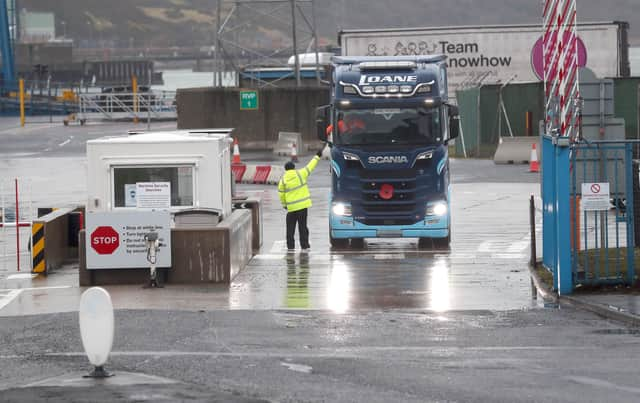Northern Ireland Protocol is legally ‘rotten to the core’, High Court told


Counsel for a group of unionist politicians claimed the post-Brexit trading arrangements are incompatible with domestic and European law.
John Larkin QC argued that the protocol has been “inflicted” in breach of enshrined rights to representative democracy.
Advertisement
Hide AdAdvertisement
Hide AdHe said: “Bearing in mind the multi-faceted legal and constitutional critique, based on the European Convention on Human Rights, or indeed on EU law itself, the protocol as a matter of law should be regarded simply as legally rotten to the core.”
Implemented as part of the Brexit deal, the protocol is aimed at preventing a hard land border on the island of Ireland.
But it has created an effective trade border between Great Britain and Northern Ireland, with the region remaining in the EU single market for goods.
Amid disruption to business at Irish Sea ports since January, the legality of the protocol is being challenged by a group including TUV leader Jim Allister and outgoing DUP and UUP chiefs Arlene Foster and Steve Aiken.
Advertisement
Hide AdAdvertisement
Hide AdThey contend that it contravenes both the Acts of Union 1800 and the 1998 Good Friday Agreement.
On day two of proceedings, Mr Larkin directed his attack on alleged breaches of the Treaty on European Union (TEU).
Article 10 of the treaty sets out how its functions are founded on representative democracy.
But the barrister described a further provision where citizens directly represented at Union level in the European Parliament as “hollow mockery”.
Advertisement
Hide AdAdvertisement
Hide Ad“No citizen of Northern Ireland - Irish, British or both - is represented in the legislature that holds such important sway here,” he said.
Mr Justice Colton was also taken to Article 50 of the TEU, dealing with how a member state can leave the EU.
Even though it states treaties shall cease to apply to the state in question from the date of entry into force of the withdrawal agreement, Mr Larkin insisted the “open-ended and indefinite application” of provisions to Northern Ireland alone is unlawful.
In further submissions he said the protocol “falls spectacularly foul” the right to free elections dealt with by Article 3, Protocol 1 of the European Convention of Human Rights.
Advertisement
Hide AdAdvertisement
Hide Ad“Citizens here are subject to laws in whose making they have no part,” the barrister said.
Later, he added: “The UK has inflicted this on us.”
Any suggestion that the challenge has been mounted out of time was also rejected.
“The submarine may have left port a while ago, but it still puts its periscope up and it still opens its torpedo ports, so we are entitled to take action every time it does those harmful things,” Mr Larkin maintained.
A related case by loyalist pastor Clifford Peeples is also being heard as part of the wider judicial review.
Advertisement
Hide AdAdvertisement
Hide AdThe Belfast man’s lawyers claim the protocol breaches the Good Friday Agreement and must be subject to a referendum.
Ronan Lavery QC told the court there can be no constitutional change without the consent of the people of Northern Ireland.
The hearing continues.